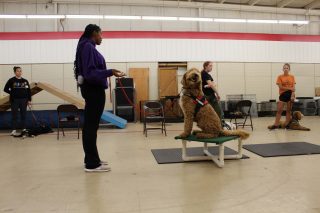Service and support animals have become more prevalent in recent years, and research studies have shown the important roles they can play in our physical and mental health. Some research suggests that these canine companions can trigger the same brain pathways as the ones active when parents and babies bond, while other studies show that they can reduce feelings of loneliness and depression. It’s becoming increasingly clear that having a pup by your side can improve well-being. Here’s a rundown of the different types of working pups and the ways these animals can positively impact your health.
Service Dogs
 Service dogs, of which there are around 500,000 in the US today, occupy a distinct position in the spectrum of support animals. These highly trained pups can perform tasks that provide valuable or even life-changing support to individuals of all ages with physical or other disabilities. Service dogs can help someone with visual impairment navigate public transportation, help someone with mobility issues retrieve items, alert an individual with epilepsy to an imminent seizure, or support someone with post-traumatic stress disorder. However, their assistance can extend far beyond the work they’re trained to do. Service dogs also serve as unwavering companions, fostering a sense of self-reliance and self-esteem within their handlers. This loving companionship profoundly impacts mental health, reinforcing confidence and boosting an individual’s overall well-being. A service pup can help an individual regain some independence to navigate day-to-day tasks and activities.
Service dogs, of which there are around 500,000 in the US today, occupy a distinct position in the spectrum of support animals. These highly trained pups can perform tasks that provide valuable or even life-changing support to individuals of all ages with physical or other disabilities. Service dogs can help someone with visual impairment navigate public transportation, help someone with mobility issues retrieve items, alert an individual with epilepsy to an imminent seizure, or support someone with post-traumatic stress disorder. However, their assistance can extend far beyond the work they’re trained to do. Service dogs also serve as unwavering companions, fostering a sense of self-reliance and self-esteem within their handlers. This loving companionship profoundly impacts mental health, reinforcing confidence and boosting an individual’s overall well-being. A service pup can help an individual regain some independence to navigate day-to-day tasks and activities.
Therapy Dogs
Therapy dogs make up a diverse category of support animals who serve the community. Rather than being solely devoted to an individual, like a service dog,  therapy pups can accompany their owner and provide comfort and relief across environments. Whether they find themselves in hospitals, schools, nursing homes, or communities recovering from disaster, their mission is to alleviate stress, encourage positive social interaction, and boost mental and emotional well-being. A recent study found, “Short-term, unstructured interactions with a therapy dog can significantly reduce self-reported anxiety and distress levels.” The calming presence of these pups can offer a distraction from distressing circumstances, create a more uplifting environment, or even spark joy in those they touch. Their therapeutic impact can be immediate and lasting, underscoring the power of a therapy dog’s companionship in promoting overall mental health.
therapy pups can accompany their owner and provide comfort and relief across environments. Whether they find themselves in hospitals, schools, nursing homes, or communities recovering from disaster, their mission is to alleviate stress, encourage positive social interaction, and boost mental and emotional well-being. A recent study found, “Short-term, unstructured interactions with a therapy dog can significantly reduce self-reported anxiety and distress levels.” The calming presence of these pups can offer a distraction from distressing circumstances, create a more uplifting environment, or even spark joy in those they touch. Their therapeutic impact can be immediate and lasting, underscoring the power of a therapy dog’s companionship in promoting overall mental health.
Emotional Support Dogs
Emotional support dogs can provide unique support, particularly for those wrestling with emotional or mental health issues like anxiety, depression, or phobias. The Americans With Disabilities Act (ADA) defines emotional support pups as “assistance animals that are not trained to perform a specific task but may provide other therapeutic benefits.” Unlike service or therapy dogs, emotional support dogs aren’t required to undergo specialized training. The simple act of companionship is their primary function – a role that can provide a calming effect, ease feelings of loneliness and even elevate our mood.
Facility Dogs
Rounding out the support animal spectrum are facility dogs. These dogs are specially trained to work a given set of hours in a specific facility, whether that’s a school, assisted living community, or rehabilitation center. They may help with specific therapeutic goals, like stimulating memory recall and enhancing motor skills, or educational goals. Some other socio-emotional benefits for children include a growth in confidence levels, improvement in reading and problem-solving skills, and a reduction in stress levels as a result of spending time with a facility dog in the classroom setting. Facility dogs can provide comfort and support during the sometimes-taxing path to recovery or a stressful day at school. In classroom settings, they can encourage and stimulate conversation even from students who struggle in social settings. Wherever they are, they can foster a sense of achievement and confidence in the population they serve.
They may help with specific therapeutic goals, like stimulating memory recall and enhancing motor skills, or educational goals. Some other socio-emotional benefits for children include a growth in confidence levels, improvement in reading and problem-solving skills, and a reduction in stress levels as a result of spending time with a facility dog in the classroom setting. Facility dogs can provide comfort and support during the sometimes-taxing path to recovery or a stressful day at school. In classroom settings, they can encourage and stimulate conversation even from students who struggle in social settings. Wherever they are, they can foster a sense of achievement and confidence in the population they serve.
There’s no doubt that many people experience the extraordinary roles that dogs can play in improving well-being. Whether they’re highly trained service animals or humble house pets, pups provide us with both tangible and intangible benefits.


